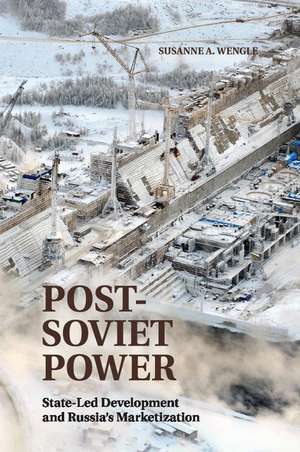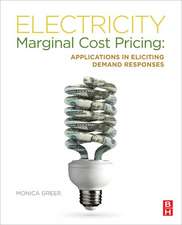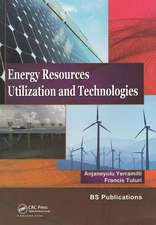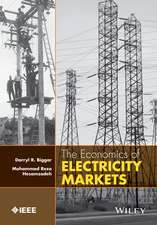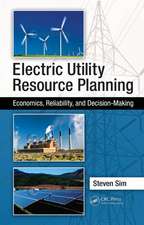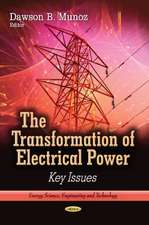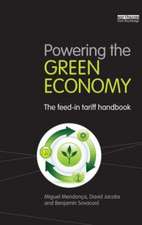Post-Soviet Power: State-led Development and Russia's Marketization
Autor Susanne A. Wengleen Limba Engleză Paperback – 25 noi 2015
| Toate formatele și edițiile | Preț | Express |
|---|---|---|
| Paperback (1) | 286.30 lei 43-57 zile | |
| Cambridge University Press – 25 noi 2015 | 286.30 lei 43-57 zile | |
| Hardback (1) | 696.60 lei 43-57 zile | |
| Cambridge University Press – 4 feb 2015 | 696.60 lei 43-57 zile |
Preț: 286.30 lei
Nou
Puncte Express: 429
Preț estimativ în valută:
54.80€ • 59.55$ • 46.06£
54.80€ • 59.55$ • 46.06£
Carte tipărită la comandă
Livrare economică 21 aprilie-05 mai
Preluare comenzi: 021 569.72.76
Specificații
ISBN-13: 9781107420922
ISBN-10: 110742092X
Pagini: 310
Ilustrații: 17 b/w illus. 1 map 16 tables
Dimensiuni: 152 x 228 x 17 mm
Greutate: 0.42 kg
Editura: Cambridge University Press
Colecția Cambridge University Press
Locul publicării:New York, United States
ISBN-10: 110742092X
Pagini: 310
Ilustrații: 17 b/w illus. 1 map 16 tables
Dimensiuni: 152 x 228 x 17 mm
Greutate: 0.42 kg
Editura: Cambridge University Press
Colecția Cambridge University Press
Locul publicării:New York, United States
Cuprins
Introduction: Russia's political marketization; Part I: 1. From ministry to market; 2. Power politics; 3. Regionally patterned pacts and the political life of things; Part II: 4. Privatization - competing claims and new owners; 5. Liberalization - the price of power; 6. Expertise - engineers versus managers; Conclusion: development as contingent transformations.
Recenzii
'The first full-length study of Russia's electricity industry, the backbone of the Russian economy. Wengle shows how a sustained decade-long program to privatize the industry was forced to compromise with the realities of Russia's complex geography and the mutual dependence of state officials and business interests. Essential reading for anyone trying to understand why Russia has failed to develop into a competitive market economy.' Peter Rutland, Wesleyan University
'Susanne Wengle presents fresh and enormously insightful perspectives on many of the most important transformations of the last two decades. Post-Soviet Power should be required reading for those interested in everything from privatization to price liberalization, from the rise of oligarchs in the 1990s to state centralization in the 2000s, and from the Russian electricity sector to the political economy of development worldwide.' Douglas Rogers, Yale University
'Through a careful study of reforms in the electricity sector, Susanne Wengle offers a powerful, compelling argument about how the evolution of post-Soviet marketization has coexisted with, and is partly dependent on, the reassertion of state authority in the Putin era. Such a theoretically sophisticated analysis of Russia's political economy is long overdue. I enthusiastically recommend this book to anyone interested in Russian politics, post-communist transitions, development studies, or comparative political economy writ large.' Rudra Sil, Director, Huntsman Program in International Studies and Business, University of Pennsylvania
'Most social scientists have understood the post-Soviet Russian state as an arena for the interplay of interests, focusing on corruption or struggles among powerful groups. Susanne Wengle's remarkable study of electricity sector transformation advances a meticulously researched, powerfully argued, and deeply persuasive counterclaim: federal and regional efforts to promote broad social and developmental aims are essential to understanding the political economy of post-socialism. Wengle's sophisticated approach to enduring conceptual quandaries - such as the interplay of ideas and interests, and the mutually constitutive relationship of politics and the economy - merits the attention of scholars interested in the political economy of reform more broadly, as they greatly enrich our toolkit for studying contemporary forms of state-led development around the world.' Stephen J. Collier, The New School for Social Research
'Susanne Wengle presents fresh and enormously insightful perspectives on many of the most important transformations of the last two decades. Post-Soviet Power should be required reading for those interested in everything from privatization to price liberalization, from the rise of oligarchs in the 1990s to state centralization in the 2000s, and from the Russian electricity sector to the political economy of development worldwide.' Douglas Rogers, Yale University
'Through a careful study of reforms in the electricity sector, Susanne Wengle offers a powerful, compelling argument about how the evolution of post-Soviet marketization has coexisted with, and is partly dependent on, the reassertion of state authority in the Putin era. Such a theoretically sophisticated analysis of Russia's political economy is long overdue. I enthusiastically recommend this book to anyone interested in Russian politics, post-communist transitions, development studies, or comparative political economy writ large.' Rudra Sil, Director, Huntsman Program in International Studies and Business, University of Pennsylvania
'Most social scientists have understood the post-Soviet Russian state as an arena for the interplay of interests, focusing on corruption or struggles among powerful groups. Susanne Wengle's remarkable study of electricity sector transformation advances a meticulously researched, powerfully argued, and deeply persuasive counterclaim: federal and regional efforts to promote broad social and developmental aims are essential to understanding the political economy of post-socialism. Wengle's sophisticated approach to enduring conceptual quandaries - such as the interplay of ideas and interests, and the mutually constitutive relationship of politics and the economy - merits the attention of scholars interested in the political economy of reform more broadly, as they greatly enrich our toolkit for studying contemporary forms of state-led development around the world.' Stephen J. Collier, The New School for Social Research
Notă biografică
Descriere
Examines the transformation of the Russian electricity system during post-Soviet marketization, arguing for a view of economic and political development as mutually constitutive.
